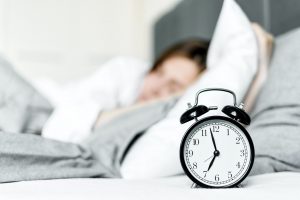 If you have untreated sleep apnea, you know firsthand the challenges the disorder can create for your quality of life. Fatigue, irritability, and headaches can affect how you feel throughout the day. You might feel years older than you should. You’re not imagining things. A recent study has found a connection between age acceleration and sleep-disordered breathing. Here’s what you need to know to slow down the clock and feel your best.
If you have untreated sleep apnea, you know firsthand the challenges the disorder can create for your quality of life. Fatigue, irritability, and headaches can affect how you feel throughout the day. You might feel years older than you should. You’re not imagining things. A recent study has found a connection between age acceleration and sleep-disordered breathing. Here’s what you need to know to slow down the clock and feel your best.
Sleep Apnea Connected to Age Acceleration
The American Academy of Sleep Medicine recently released information about epigenetic age acceleration and its connection with sleep disturbances caused by certain breathing disorders. They found changes to the DNA of cells could increase the risk of age-related conditions, like dementia and certain cancers.
Obstructive sleep apnea affects nearly 30 million adults in the U.S. It causes frequent pauses in breathing from an obstruction in the upper airway while sleeping. Each event depletes the body of oxygen and interrupts your sleep cycle. Without any treatment, you can develop several serious issues, like cardiovascular disease, sleep deprivation, and memory loss.
Unfortunately, the risks don’t stop there. A study by Harvard Medical School found patients with sleep apnea had accelerated aging in their cells that didn’t match their chronological age. They used the apnea-hypopnea index, which is a point system used for categorizing the severity of breathing interruptions per night. Researchers found there were about 215 days of rapid aging in the participants’ cells. The more severe the apnea-hypopnea index, the faster the aging. Some OSA patients were linked to 321 days of accelerated aging.
The changes in your cells can increase your risk of various age-related conditions, like functional decline, cardiovascular disease, and dementia. Although more research is needed to determine how sleep apnea treatment can affect the aging of cells, researchers propose it can reverse some of the variations.
Slow the Clock with Sleep Apnea Therapy
You can sleep peacefully with the right treatment using sleep apnea therapy. A CPAP machine is the most traditional method, which involves wearing a mask over your nose to deliver a steady stream of air pressure to prevent pauses in breathing. Although it is effective, it can be bothersome for some patients.
As an alternative, you might be a candidate for an oral appliance. The custom-fit device looks like an athletic mouthguard; however, it serves a different purpose. It protrudes the lower jaw forward or holds the tongue in place to prevent an obstruction in the airway. It’s a comfortable, convenient solution to breathe easier and sleep soundly.
You can ensure you have a long life ahead of you with the right sleep apnea treatment. Don’t spend another night tossing and turning.
About Dr. Jerry Janzen
Dr. Janzen earned his dental degree from the University of Saskatchewan before continuing his education in advanced studies, like orthodontics, myofunctional orthodontics, and endodontics. He has also completed additional training in sleep apnea therapy. If you’re ready to breathe better, contact our office today to see if an oral appliance is right for you.
